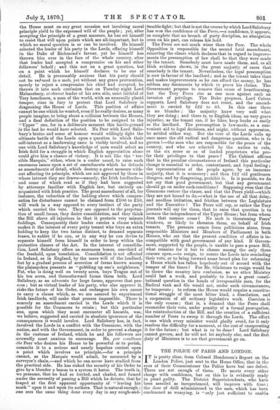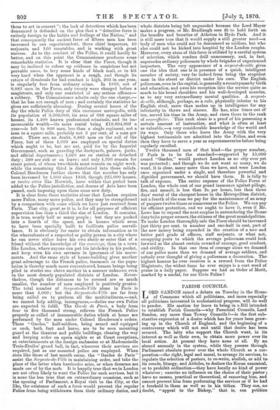THE POLICE OF PARIS AND LONDON.
IT is pretty clear, from Colonel Henderson's Report on the London Police, just sent to the Home Office, that in the eyes of their Commissioner the Police have but one defect. There are not enough of them. He meets every other charge with confidence, but on this he is evidently ready to plead guilty. The District Superintendents, who have been assailed as inexperienced, will improve with time ; the dose of drill administered to the men, which has been condemned as wearying, is "only just sufficient to enabla them to act in concert "; the lack of detectives which has been denounced is defended on the plea that a "detective force is entirely foreign to the habits and feelings of the Nation," and that consequently the ancient force of fifteen men has been increased to one superintendent, three chief inspectors, 40 serjeants, and• 160 constables, and is working with great success. As to the conduct of the Police, it could hardly be better, and on this point the Commissioner produces some remarkable statistics. It is clear that the Force, though it may be inclined to colour up evidence in suspicious but not provable cases, to levy some kinds of black mail, or to hit very hard when the opponent is a rough, and though its return of dismissals for bad conduct is high, 203 in one year, is singularly free from ordinary crime. In 1869, out of 8,883 men in the Force, only twenty were charged before a magistrate, and only one convicted of any serious offence- s robbery. The Commissioner admits only the one charge,— that he has not enough of men ; and certainly the statistics he gives are sufficiently alarming. During several hours of the day the whole Police duty of this enormous metropolis, with its population of 3,300,000, its area of 688 square miles of houses, its 4,400 known professional criminals, and its im- measurable wealth—its mere rental being £19,804,002 a year—is left to 800 men, less than a single regiment, not a man to a square mile, probably not 3 per cent. of a man per street. There are, no doubt, 8,883 men on the roll of the Force, but of these 1,099 are employed on special duties which ought to be, but are not, paid for by the Imperial Government, such as guarding the dockyards, palaces, parks, and official departments ; 1,026 are on station or detached duty ; 500 are sick or on leave ; and only 4,996 remain for street patrol, of whom two-thirds must remain on night work, while the remaining third is distributed into three reliefs. Colonel Henderson further shows that the number has only been increased by 1,000 since 1848, though 225,000 houses, or twelve cities like Norwich, have within that period been added to the Police jurisdiction, and dozens of Acts have been passed, each imposing upon them some new duty.
It is clear from these statistics alone that London requires more Police, many more police, and they may be strengthened by a comparison with some which we have just received from Paris, That city, great as it is, is for all purposes of efficient supervision less than a third the size of London. It contains, it is true, nearly half as many people ; but they are packed into a fourth of the space, and in houses which seem to have been specially built to facilitate police surveil- lance. It is obviously far easier to obtain information as to the whereabouts of a suspected or guilty person in a city where he can never either leave his own abode or enter that of a friend without the knowledge of the concierge, than in a town like London, where anyone can put his latch-key in his pocket, and keep even his own servants in ignorance of his move- ments. And the same style of house-building gives another great advantage to the French police, insomuch as the popu- lation is thereby much more concentrated, human beings being piled in stories one above another in a manner unknown even in the most densely populated districts of London. Never- theless, though the distances to be covered are so much smaller, the number of men employed is positively greater. The total number of Sergents-de- Ville alone in Paris is more than 4,000; but the Sergents-de- Ville are far from being called on to perform all the multitudinous,—and, we cannot help adding, incongruous,—duties our own Police are expected to fulfil. The Garde de Paris, a body from four to five thousand strong, relieves the French Police properly so called of innumerable duties which at home are performed by the men under Colonel Henderson's orders. These "Gerdes," half-soldiers, being armed and equipped as such, both foot and horse, are to be seen mounting guard at the theatres and public buildings, clearing the way and keeping order on opera nights or at Court receptions,. at entertainments at the foreign embassies or at Mademoiselle Trois-Etoiles' grand ball, in fact, wherever their services are required, just as our mounted police are employed. When riots like those of last month occur, the "Gerdes de Paris" assist the Sergents-de-Ville in maintaining order, and take the place of the latter when barricades arise, or when firearms are made use of by the mob. It is happily true that we in London are not often likely to want the Police for such services, but it is none the less true that on extraordinary occasions, such as the opening of Parliament, a Royal visit to the City, or the like, the existence of such a force would prevent the regular Police from being withdrawn from their ordinary duties, and whole districts being left unguarded because the Lord Mayor makes a progress, or Mr. Bradlaugh sees fit to hold forth Olk the benefits and beauties of Atheism in Hyde Park. And it is still more true that it would supply a still greater need—a body of men who could not be denounced as soldiers, but who also could not be kicked into hospital by the London roughs. Moreover, every atom of this force is utilized by a careful system of selection, which renders drill unnecessary, and, in fact, supersedes ordinary policemen by whole brigades of experienced inspectors. The very appearance of a sergent-de-ville gives one the idea that one is in presence of a quick, intelligent member of society, very far indeed from being the stupidest man in the street or district under his care. The English policeman, even in the capital, is generally a countryman by birth and education, and owes his reception into the service quite as. much to his broad shoulders and his well-developed muscles, as to any very extraordinary mental qualities. A sergent- de-ville, although, perhaps, as a rule, physically inferior to his. Englishrival, more than makes up in intelligence for any inferiority in thews and sinews. He has, nine times out of- ten, served his time in the Army, and risen there to the rank of sous-officier. This rank alone is a proof of his possessing a certain amount of instruction, and what is often at least as valuable,—a very considerable knowledge of the world and its ways. Only those who leave the Army with the very highest testimonials are admitted into the Police, and even then they have to serve a year as supernumeraries before being regularly enrolled. Twelve thousand men of that kind—the proper number,. if Paris is to be the standard—supported by 15,000- armed "Gerdes," would protect London as no city ever yet was protected ; and though we do not want so many, we do want, it is clear, many more than we have, and were London once organized under a single, and therefore powerful and dignified government, we should have them. It is folly to. talk of expense. The entire expense of the Police Force of London, the whole cost of our grand insurance against pillage, fire, and assault, is less than 2s. per house, less than three days' rental of the cheapest house in the Metropolitan district, not a fourth of the sum we pay for the maintenance of an army of paupers twelve times as numerous as the Police. We can pay- for efficient protection, and we ought to have it, even if Mr. Lowe has to expend the next surplus in surrendering the House- duty toits proper owners, the citizens of the great municipalities. To make London thoroughly safe the Force should be increase& just thirty per cent. in number and one-half in cost, part of the new money being expended in the creation of a new and better paid grade of officers, staff serjeants, or what not, occupying posts to which the average policeman could look forward as the almost certain reward of courage, good conduct, and civility. In that one item of courage alone we demand- of our police more than we demand of average soldiers, and' nobody ever thought of giving a policeman a decoration. The highest honour he ever receives is a reward from the Police- Magistrate, the widest fame he ever enjoys is a curt word of praise in a daily paper. Suppose we had an Order of Merit,. marked by a medal, for our Civic Police ?































 Previous page
Previous page